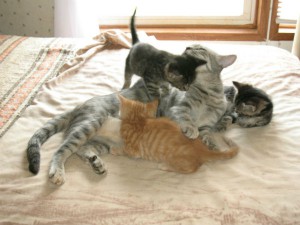Why do some cats live together successfully and others don’t?
Every cat has eccentricities which are usually a source of fun and joy for their owner and the behaviour of typical cats can differ wildly. Entrancing behaviour could be a quirky eating habit or a manner of sleeping; it could even be the way a cat interacts with its owner or nudges them for attention.
Unfortunately, not all cat behaviours are pleasant and sometimes they can do things which cause distress and upset to their owners. A common example is when they fail to live happily with other cats in the home. This is not something experienced by all cat owners so why can some felines live together as friends while others only see each other as foes? Find out why some cats get on & others don’t here.
Natural to be friends
Anyone watching kittens playing happily or who has come across crowds of stray cats cuddling up together probably finds it hard to understand why some cats insist on being the only feline pet in a household.
Most cats naturally enjoy one another’s company for grooming and play-fighting and it is unusual for a cat to be routinely aggressive towards a feline it shares a space with as most cats get along – even if it takes a little time.
Bad experiences with other cats
Often, cats which will not tolerate other felines have had bad experiences with other cats in the past. If the cat is a stray, it has likely spent a lot of time dealing with aggressive behaviour from other felines on the streets and if it is a rescue animal then it may have been cooped up with other cats and disliked the experience of competing for attention, food and a place to sleep. In a sense, these cats have not been socialised well. These kinds of experiences traumatise some cats and leave them unable to cope with having another feline in their space.
Another point worth noting is that if a cat has become accustomed to being the sole feline in a home for a long time then it will find the introduction of another cat difficult to accept. This can breed resentment and jealousy towards the new cat; potentially manifesting itself as aggressive or destructive behaviour.
Proper facilities
It is a huge mistake to assume that cats will be happy to share their eating and toilet facilities – yet it is one many owners make. If you are planning to introduce a new cat to your home or already struggle with feline fights then make sure you give them the proper facilities to feel at home. This may be why some cats get on & others don’t.
Each cat should have their own food and water bowls and litter tray to use. Remember, cats are territorial and ensuring they have areas and possessions of their own can help them feel at ease and not at competition with new animals.
Gender
It is not uncommon for two unrelated male cats to feel antagonistic towards each other. It is not natural for them to share their territory and this is where aggression and animosity can stem from. If they are neutered, the situation will likely improve so it’s worth speaking to your vet about this option.
Now you know the reasons why some cats may not get along, don’t forget it’s important to protect your cat with Argos Pet Insurance provided by Pinnacle Insurance plc. Explore our cat insurance policies today.






